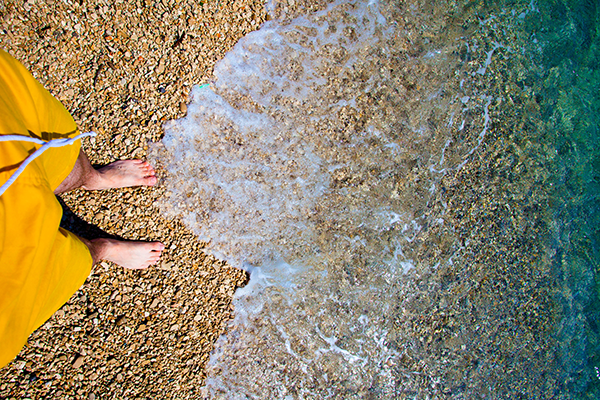Globe-trotting liberal arts students share their summer experiences
Classes are officially back in session and another summer has come to an end. Liberal arts students made their time away from Austin count by taking on amazing adventures that enriched their academic, personal and professional lives. From an anthropological dig in Belize to a prestigious public policy program in Pittsburgh to a cross-country charitable bike ride to Alaska, read about these incredible summers below.
Jordan Metoyer
Economics and Urban Studies senior, Intellectual Entrepreneurship Scholar
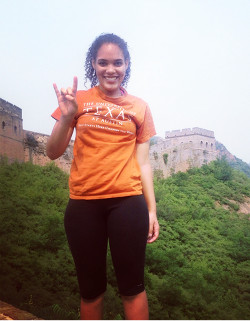 Where did you go this summer and what did you hope to accomplish?
Where did you go this summer and what did you hope to accomplish?
For the first half of summer I traveled to Beijing as a Division of Diversity and Community Engagement Fellow under the direction of Drs. Ge Chen and Leonard Moore to compare social enterprise strategies in China and the United States. I chose to focus on housing access for rural-to-urban migrant families, which is regulated by the hukou system. In addition to conducting research, I also taught English at the Dandelion School, an elementary school for migrant children.
Once I arrived back in the states, I traveled to San Francisco for a summer internship with Public Advocates Inc., a nonprofit law firm and advocacy organization fighting the systemic causes of racial discrimination and poverty by empowering community voices and achieving tangible legal victories. Public Advocates’ commitment to advancing education, housing and transit equity has resulted in its reputation as “the small but noisy law firm.”
Did you come away with any important insights?
Whenever I travel and intern during the summer months, I discover new insights about myself, the nature of human interaction and leading discussions in fields of personal interest. This summer continued to fit that mold. Primarily, I learned the many privileges I hold in an international context. When I listened to the students at school in China describe their living situations during the migratory transition from rural villages to Beijing, I became increasingly aware of the links between safe, sanitary, permanent housing and opportunity. The disparity in educational outcomes between children who have a place to call home and others who face conditions of homelessness is astounding. In addition, I reaffirmed my belief that social capacity building is impossible without meaningful partnerships. In order to continue legacies of sustainable community development, partners in host countries must not only have a seat at the table, but also an appreciated voice in the conversation.
I was lucky enough to return to the United States and intern for an organization that implements this model of community partnership, specifically in its work on local control school funding and a Bay Area redevelopment plan.
What was your most memorable moment this summer?
This summer, I set a personal objective to lend myself to as many new experiences as possible. After photographing a staff attorney in a discussion about inequitable transportation options during a town hall meeting, climbing 1,500 feet to the peak of a Jianshanling mountain, navigating the halls of the California Capitol, bartering with a Beijing antique vendor and gaining a cherished glimpse into the lives of human beings who share my same span of history, I can confidently say that I exceeded my goal.
How do you think your research experiences abroad will be helpful in the future?
During summer internships, students connect the theories learned in the confines of the classroom to a vastly different setting. For me, I was able to connect my interdisciplinary academic background and housing policy research to Public Advocates’ anti-displacement policies.
From community organizing to corporate revenue analysis, the opportunities for summer internships are as varied as the majors offered at UT. What starts at this incredible university can, and quite often does, change the world. The first step in this process is putting the invaluable resources and knowledge one gains after their time at UT to use.
What are your post-graduation plans? And did your summer experiences solidify these aspirations, or were you inspired to pursue a different path?
After obtaining my BA in Economics and Urban Studies, I plan to continue gaining experience in civic engagement, housing and urban development policy and political organizing before attending graduate school for public policy and urban planning. I am particularly interested in attending a graduate school daring enough to tackle the world’s largest and most complex issues. This was undoubtedly shaped by my experience traveling to Beijing and interning at Public Advocates.
Kabir Husain
Islamic Studies graduate
Photo credit: Aaron Leondar
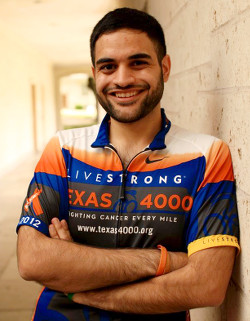 Where did you go this summer and what did you hope to accomplish?
Where did you go this summer and what did you hope to accomplish?
I biked 4,500 miles from Austin to Anchorage, Alaska with Texas4000. The journey took 70 days. I was a part of the Rockies route, which followed the Rocky Mountains. We biked through Texas, Oklahoma, Kansas, Colorado, Wyoming, Montana, Alberta, British Columbia, Yukon and, finally, Alaska. Through this journey I hoped to spread hope and knowledge about cancer to as many people as possible. Being a Muslim, I also wanted to help eradicate the notion of Islamaphobia in the United States.
Did you come away with any important insights?
The insights I gained this summer are invaluable. I was able to witness such positivity and kind-heartedness this summer, to the extent that I have never seen before. I spoke with many cancer survivors and the strength, positivity and hunger for life that they had was amazing and uplifting. There were also so many people who helped us along with way, whether it was with food or giving us a place to stay, and without all of them our ride would not have been possible.
This summer also taught me to appreciate things in life that I took for granted, such as clean drinking water, a bed, a roof over my head, showers, clean laundry and food. All of these everyday normalities were luxuries on the road and not having them definitely makes you take a step back and look at how lucky you are.
What was your most memorable moment this summer?
Mount Evans is the highest paved road in North America at 14,209 feet and it was a personal goal of mine to bike up this mountain. It is so taxing and one has to be more mentally strong than physically strong. The mountain throws different elements at you such as snow, wind, rain and lack of oxygen. This was the most physically challenging thing I have ever done, but it was also the most mentally challenging. I learned that anything is possible with a positive mindset and the will to never give up.
How do you think your research experiences abroad will be helpful in the future?
I believe that this journey is only the beginning of a life of challenges and pushing myself. I will not let this ride be the greatest thing I do. Just biking 4,000 miles has given me the mindset and belief that I can achieve success at anything I put my mind to. I plan on becoming a doctor and working hard to become the best that I can be.
What are your post-graduation plans? And did your summer experiences solidify these aspirations, or were you inspired to pursue a different path?
Since graduating in the spring I have applied to many medical schools across the country, including Texas. I plan on becoming a surgeon of some sort in the future. This ride resolved my decision to pursue medicine. Hearing all the stories from cancer survivors and from those who have lost people to cancer has solidified my dream to become a doctor.
Stacy Drake
Anthropology Ph.D. student, Intellectual Entrepreneurship Scholar
 Where did you go this summer and what did you hope to accomplish?
Where did you go this summer and what did you hope to accomplish?
I spent a month in northwestern Belize conducting archaeological research on the ancient Maya. I serve as a graduate staff member for UT Anthropology’s yearly archaeology field school, which operates in conjunction with the Programme for Belize Archaeological Project (PfBAP). This summer I worked to not only conduct my own dissertation research on burial practices of the ancient Maya, but also to aid UT students in learning archaeological excavation techniques.
My research goals for this summer (my fifth participating in the field school) were to complete excavations of human burials uncovered in the field by other archaeologists and to train students, two of whom I worked closely with through the Intellectual Entrepreneurship program (IE) at UT, in proper techniques for the excavation of human remains. I also worked closely with students from the IE program on analyzing human remains to gain insight on past life experiences of the ancient Maya.
Did you come away with any important insights?
With the help of the students participating in the PfBAP field school and my two IE mentees, I was able to excavate and analyze a number of human burials. Some of the individuals we investigated this summer died at a very young age. Looking at the remains of Maya children, while a somber experience, provides us with a wealth of information on the lived experiences of all sorts of people in the Maya world – adults and children alike.
What was your most memorable moment this summer?
I was approximately four months pregnant in the field and my most memorable moment by far was when I felt my baby kick for the first time while I was excavating a burial with other students and colleagues.
How do you think your research experiences abroad will be helpful in the future?
My experiences will continue to provide me with valuable information on the life and death experiences of ancient Maya individuals and social groups. The data I collected this summer, in addition to what I have collected in past field seasons, will aid me in my dissertation research and will hopefully serve as a beneficial resource of information regarding the ancient Maya of northwestern Belize.
I also hope that these experiences will continue to benefit other students through the IE internship program and the field school. PfBAP has led me to many great contacts and friendships over the years, and I look forward to continuing to meet new students in the future. Spending a month or two in the jungle and excavating ancient Maya sites and burials is an unforgettable experience, and I hope that future students will continue to be inspired by their own experiences and work to become future archaeologists.
What are your post-graduation plans? And did your summer experiences solidify these aspirations, or were you inspired to pursue a different path?
Once I graduate I hope to become a professor of archaeology and forensic anthropology. I am also interested in the public outreach realm of archaeology, in which archaeologists serve to inform local communities about their local history and the archaeological research going on in their own backyards. The ability to work through a field school and conduct my own dissertation research while teaching and training students at the same time inspires me to want to continue teaching interested students in the future. I am passionate about understanding human experiences through skeletal remains, but I am also passionate about providing interested and excited students with opportunities to follow their interests. The ability to combine both in the future career of teaching classes in the topics I love is a perfect fit for me.
Katie Jensen
Sociology Ph.D. student
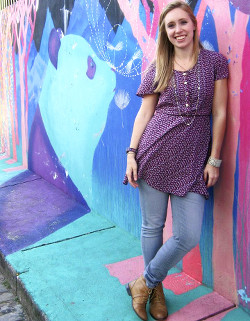 Where did you go this summer and what did you hope to accomplish?
Where did you go this summer and what did you hope to accomplish?
I spent this summer in Rio de Janeiro, where I returned to my field research site, the Caritas Refugee Center. I research the asylum-screening process in Brazil and Argentina, and I look particularly at how the ways those two countries understand blackness affect the experiences of recent African asylum seekers there. Everyone who applies for asylum in Rio does it through Caritas, which interviews applicants and produces case recommendations for the state’s deciding committee. But Caritas also provides a variety of social services for refugees and asylum seekers: Portuguese classes, psychological support, artisanal workshops, financial support for the most vulnerable, etc. In this sense, the Brazilian asylum-screening model varies greatly from the U.S. system. In Brazil, civil society organizations play an integral role in the screening process in the hope that applying for asylum will not further marginalize already vulnerable populations.
This summer I hoped to further my observations of how the asylum process works on the ground in countries like Brazil, where state asylum policies are defined not by immigration control and national security concerns, but instead inspired by human rights discourse.
Did you come away with any important insights?
Absolutely! In spite of Brazil’s truly amazing policies, I was struck by how low-level officials in different stages of the process could still make seemingly small mistakes or misguided decisions – based on a lack of information and training, or because of social and racial prejudices – that could have disastrous consequences for the asylum seekers. This summer, for example, I worked on the case of an African national whose claim for asylum had been rejected by the state for what I saw as the most bogus reasons. His English was extremely poor, but his final interview with the state representative was conducted in English, not his native language. Unfortunately his many mistakes with dates, words and numbers – easily explained by his poor language skills – were used to discredit his application. We submitted an appeal and are now anxiously awaiting the state’s decision.
What was your most memorable moment this summer?
While my fieldwork was incredibly rewarding and fulfilling, being in Brazil for the recent wave of protests was hands down one of the most memorable experiences of my life. It was absolutely historic. On June 20, roughly a million people went into the streets to protest. What had begun as a movement against a bus fare increase gained widespread national participation as protesters rallied against multiple social grievances, including corruption and abysmal social services. The streets filled with a special energy that only comes with the new and unexpected. Most of the young Brazilians who participated had never imagined they would join in collective action, in part because they had never seen it happen before in their country. You can find more of my thoughts about the protests here.
How do you think your research experiences abroad will be helpful in the future?
The fieldwork I did this summer was an incredibly important part of establishing myself at my field research site. I built closer relationships with the Caritas staff and those who came to the center, and I collected the preliminary data that will prepare me for my dissertation proposal and corresponding fieldwork in Brazil during the next two years.
What are your post-graduation plans? And did your summer experiences solidify these aspirations, or were you inspired to pursue a different path?
After completing my Ph.D. at The University of Texas, I hope to work as a sociology professor. My dream would be to teach half the year in the United States, and the other half abroad – ideally in South America. Having time back in South America reminded me how important I think it is to insert myself into and engage with a variety of intellectual communities.
While teaching is a serious passion of mine – I find it to be a rewarding and invigorating experience – being in the field this summer rekindled my love for ethnographic fieldwork. Engaging in activist research, where I not only observed social processes but also dialogued and worked with involved actors on how to name and address some key issues, reminded me how important both teaching and research truly are to me.
Ana Rivera
Government and Humanities Honors senior, Intellectual Entrepreneurship Scholar
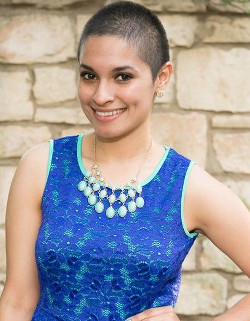 Where did you go this summer and what did you hope to accomplish?
Where did you go this summer and what did you hope to accomplish?
Thanks to the Intellectual Entrepreneurship Program, this summer I participated in the competitive Public Policy and International Affairs Fellowship Program at the H. John Heinz III College at Carnegie Mellon University in Pittsburgh (PPIA). The PPIA Fellowship Program helps students from diverse social and economic backgrounds achieve higher educations and careers in public policy and international affairs. Twenty students from a national application pool were invited to participate in the 2013 Heinz College PPIA Junior Summer Institute. I was the only student selected from The University of Texas at Austin.
As a PPIA fellow, I hoped this program would help me look at how differing policies affect communities, states and countries—allowing me to gain a well-rounded academic and intellectual foundation to assist me in accomplishing my professional goals. Thus, I hoped to learn how to create effective policies that would improve the state of Texas and the nation as whole.
Did you come away with any important insights?
Being a PPIA Fellow at CMU, I had the opportunity to take graduate-level courses such as Critical Policy Issues in the U.S., Obama’s Foreign Policy, Applied Statistics for Public Policy and Applied Economics. I did not realize how intensive and challenging this program would be. However, it was such a rewarding and unforgettable experience. I had the opportunity to meet accomplished young student leaders from across the nation and world who work on domestic or international issues and policy.
This experience allowed me to interact with prestigious professors and public servants and learn more about different policy graduate programs, but most importantly, it helped me define my future goals in academia and public service.
What was your most memorable moment this summer?
Being in a highly selective and competitive program, I had the opportunity to build a strong network within my Carnegie Mellon PPIA cohort. This program did not create a sense of competition with one another, but rather, created a support system. We learned a lot about our future goals and aspirations. Now that the fellowship program is over, I know that I can count on some of the most passionate and genuine young leaders who are serving, working or fighting against injustices.
How do you think your research experiences abroad will be helpful in the future?
The PPIA Fellowship program was a stepping-stone toward my future academic and professional goals. It also gave me the confidence to apply to the top policy schools in the nation. Because of this fellowship program, I won’t have to worry about any financial burdens because I will receive help and aid to cover the costs for graduate school.
What are your post-graduation plans? And did your summer experiences solidify these aspirations, or were you inspired to pursue a different path?
My plan after graduation is to gain work experience in the education or nonprofit sector. I want to serve my community and help those who are in dire need for the next few years. Then I plan to get my master’s and doctorate degrees in public policy and immerse myself in a public service career in Texas. In terms of my long-term aspirations, I hope to create change through policy and make a difference within the U.S. Hispanic and Latino community. Being a PPIA Fellow helped me strengthen my preparedness for achieving these goals.
Banner credit: Flickr Creative Commons: “Eole Wind”
